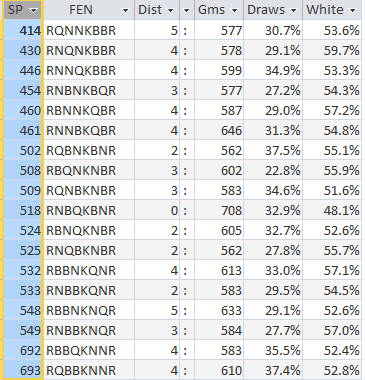This month's
Chess Life (August 2023) had a three page article relevant to the world of chess960. Titled
'Chess18 :
Streamers descend on a
giant log cabin to try
their hands at an
interesting variant'
by GM Larry Kaufman, it started,
Recently I had the opportunity
to participate, at least for a bit,
in a fun chess event at the Timber
Moose Lodge in Timber Lakes, Utah,
along with some of the most popular chess streamers
around.
It wasn't a world championship, but it was the first
master-level chess18 tournament, and it was watched by
chess fans around the globe.
Chess18 is a subset of chess960, or as it more popularly
known, "Fischer Random" chess. It uses the 18 positions
of chess960 where the Kings and Rooks begin on their
normal squares -- the upshot is that no special castling
rules are needed.
Later in the article, GM Kaufman admitted,
I have long liked the concept of Chess18,
so in 2020 I organized a four-game Chess18
Rapid match between the Komodo
chess engine and 2018 Reykjavik
Open Chess960 champ GM Alex
Lenderman, with Komodo giving
knight odds.
This isn't the first time that 'chess018' (as I'll call it for the purpose of searching on this blog) has been discussed here. More than ten years ago I posted
'Bizarre Castling Rules'?
(July 2013), which quoted someone else saying,
This variant, which I have dubbed Chess18, has a randomized opening setup just like its "predecessors." The difference is that the Rooks and the King start on the same squares that they do now so that castling remains exactly the same as it is now -- problem solved!
Ten years on I can say with some authority that the 'bizarre castling rules' add an extra dimension to the opening strategy in a game of chess960. Instead of automatically castling O-O as in the majority of games using the traditional start position (SP518 RNBQKBNR), the players have to consider which of the three castling options is best -- O-O, O-O-O, or neither -- for themselves and for the opponent in the given start position. This consideration affects the choice of development for the other pieces.
Before that 'bizarre rules' post, I wrote
Not Everyone Likes Chess960
(December 2011), where I noted,
There is nothing to stop any circle of players -- be they GMs or club players -- from restricting their chess960 activity to a handful of positions. This is, after all, what traditional chess does in restricting its focus to SP518. The rest of the world should not be obliged to follow their narrow choice.
That thought is still a guiding light for me. 'Let a thousand flowers bloom' becomes 'Let 960 flowers bloom'.
***
A few other points came to mind while I was writing this post.
One of the obvious, although unspoken, advantages of chess018 is that chess engines don't have to be altered to play it. Of course, in 2023 any engine that doesn't understand chess960 castling rules is a contender for the chess engine graveyard.
Re 'automatically castling O-O as in the majority of games using SP518', I'm not sure whether I've already posted on this. How do the other 'chess018' positions compare to SP518?
Re Kaufman's aside -- 'chess960, or as it more popularly known, "Fischer Random" chess' -- I've assumed for a few years now that this was indeed the current trend. Last month, while I was researching material for a post, I searched on both 'chess960' and 'fischer random' plus a keyword/phrase using several different search terms. I had more hits on 'chess960' than on the alternative. This is only anecdotal evidence and should be tested more rigorously. But how?
Re 'chess018', I'm going to try to stick to 'chessnnn' to name subsets of chess960. The leading zero in '018' is a bit geeky, but so what?
Re '18 positions of chess960', did the organizers allow SP518? Some people use 'chess959' to describe the full 960 positions less SP518. It's not a bad convention. Some more conventions:
'chess001' for the SP518 crowd (the chances of that catching on are exactly zero);
'chess002' for SP518 and SP534 only (the King and Queen switched), and
'chess000' for people who hate chess.
One more idea that could be easily tested is to look at the chess018 start positions (SPs) on CCRL. Which SP is statistically best? Which is worst? What are the most popular first moves for each SP? Sounds like another post is taking form.

